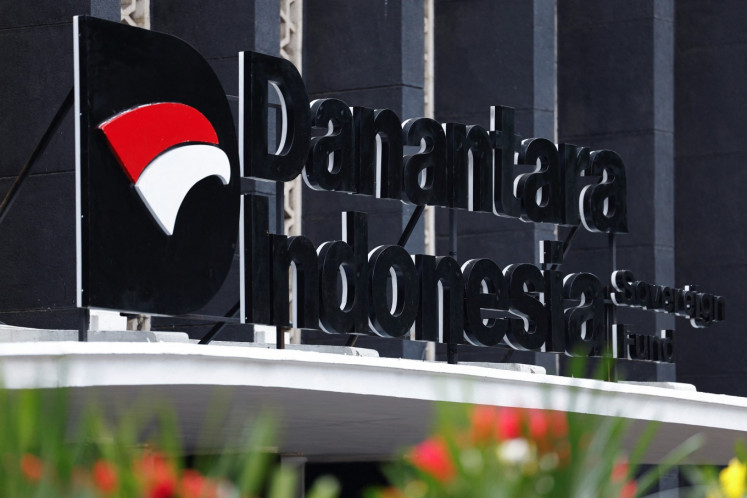Popular Reads
Top Results
Can't find what you're looking for?
View all search resultsPopular Reads
Top Results
Can't find what you're looking for?
View all search resultsHunting wild boar the Sumbawa way
On the hunt: Groups of famers ready to hunt wild boar with their hunting dogs in Bintang Bano in Brang Rea district, West Sumbawa regency
Change text size
Gift Premium Articles
to Anyone
O
span class="caption" style="width: 510px;">On the hunt: Groups of famers ready to hunt wild boar with their hunting dogs in Bintang Bano in Brang Rea district, West Sumbawa regency.(JP/Panca Nugraha)
Farmers in Sumbawa and West Sumbawa regencies in West Nusa Tenggara (NTB) maintain a unique tradition of collective hunting to safeguard their crops from wild boar invasions.
Men hunt the boars in groups by traditional means with the aid of hunting dogs. Called maen bai, the Sumbawa term for chasing boars, this unique tradition is being promoted as a cultural and tourism event in NTB.
Recently, the West Sumbawa regional administration organized a maen bai near the hilly area of Bintang Bano in Brang Rea district, West Sumbawa. Over 40 groups of farmers from several West Sumbawa districts joined the hunt.
Success story: A group of Sumbawa hunters walk with a boar they captured in the jungle of Bintang Bano on Sept. 1.(Antara/Ahmad Subaidi)
A group generally comprises 30 to 35 people plus eight hunting dogs. They usually wield spears, locally called foke, and daggers.
“Wild boars mostly roam the village in the dry season, potentially damaging our crops, so we regularly nganyang [hunt],” Kasim, 48, a farmer from Tepas village in Brang Rea, told The Jakarta Post.
In Tepas, one of the villages adjacent to Bintang Bano, farmers have just recently started to grow corn and tubers alongside their paddy fields following the end of their rice harvest in August.
Maen bai or nganyang, according to Kasim, has been practiced over generations in Sumbawa due to the presence of many boars harmful to crops. Kasim’s 28-man group has eight hunting dogs called asu nyanyang.
These dogs, a common breed, have been trained for years to hunt. The sense of smell and agility of the canines in rounding up boars are highly reliable in the work.
Ready: Sumbawa farmers hunt in groups of 30 to 35 and usually wield spears, locally called foke, and daggers.(JP/Panca Nugraha)
“Skilled dogs of the kind cost Rp 5 million [US$525] each. In the chase, the dogs will herd the boars and only then will we start throwing spears to paralyze the pests,” said Kasim.
Like Kasim’s group, dozens of other nganyang bands had gathered near Bintang Bano since early morning. Hundreds of visitors from Sumbawa and Lombok packed the location to watch the boar hunt.
Shouts and yells came from various directions, mixed with the dogs’ barks. The groups took their respective lanes and started hunting under challenging circumstances in the barren and dusty location. With hundreds of hunters brandishing spears and daggers, spectators had to be alert to flying weapons aimed at herded targets.
West Sumbawa Regent KH Zulkifli Muhadli said the maen bai tradition was made an annual cultural and tourism event this year.
“This time-honored local practice of West Sumbawa has the potential to attract tourists because it’s a distinctive practice of Sumbawa,” he said.
Maen bai as a tourism event, according to Zulkifli, is also meant to prevent the custom from harming the environment, as hunting groups often aim not only at wild boars but also deer.
“The regional administration has been fostering the groups in eight districts to maintain the deer population by making them aware that they’re chasing boars instead of deer,” he said.
West Sumbawa is indeed boosting its tourism potential by offering not only its natural beauty but traditions such as barapan kebo (buffalo racing) and maen bai. However, infrastructure limitations and transportation difficulties in the region have posed a constraint to interested tourists.
“It’s an exciting event but the road leading to this area is mostly damaged. If the access is smooth a lot more visitors will likely come here,” said Nanik Santi, a student from Mataram, Lombok.
Chairman of the NTB Regional Tourism Promotion Agency, Awanadhi Aswinabawa, said his office had accepted the proposal to put barapan kebo and maen bai in West Sumbawa on the tourism agenda of NTB for external promotion.
“In the future, along with Lombok, the island of Sumbawa will also get a promotional boost. This is to further the spirit of the Visit Lombok-Sumbawa 2012 program,” he said.

![On the hunt: Groups of famers ready to hunt wild boar with their hunting dogs in Bintang Bano in Brang Rea district, West Sumbawa regency.(JP/Panca Nugraha)" border="0" height="341" width="512"><span class="caption" style="width: 510px;"><strong>On the hunt: </strong>Groups of famers ready to hunt wild boar with their hunting dogs in Bintang Bano in Brang Rea district, West Sumbawa regency.<em>(JP/Panca Nugraha)</em></span></span></p><p>Farmers in Sumbawa and West Sumbawa regencies in West Nusa Tenggara (NTB) maintain a unique tradition of collective hunting to safeguard their crops from wild boar invasions.<br><br>Men hunt the boars in groups by traditional means with the aid of hunting dogs. Called maen bai, the Sumbawa term for chasing boars, this unique tradition is being promoted as a cultural and tourism event in NTB.<br><br>Recently, the West Sumbawa regional administration organized a maen bai near the hilly area of Bintang Bano in Brang Rea district, West Sumbawa. Over 40 groups of farmers from several West Sumbawa districts joined the hunt.</p><p><span class="inline inline-left"><img class="image image-_original " src="http://www.thejakartapost.com/files/images2/p21-e_39.jpg" alt="Success story: A group of Sumbawa hunters walk with a boar they captured in the jungle of Bintang Bano on Sept. 1.(Antara/Ahmad Subaidi)" title="Success story: A group of Sumbawa hunters walk with a boar they captured in the jungle of Bintang Bano on Sept. 1.(Antara/Ahmad Subaidi)" border="0" height="341" width="512"><span class="caption" style="width: 510px;"><strong>Success story: </strong>A group of Sumbawa hunters walk with a boar they captured in the jungle of Bintang Bano on Sept. 1.<em>(Antara/Ahmad Subaidi)</em></span></span><br>A group generally comprises 30 to 35 people plus eight hunting dogs. They usually wield spears, locally called foke, and daggers.<br><br>“Wild boars mostly roam the village in the dry season, potentially damaging our crops, so we regularly nganyang [hunt],” Kasim, 48, a farmer from Tepas village in Brang Rea, told The Jakarta Post.<br><br>In Tepas, one of the villages adjacent to Bintang Bano, farmers have just recently started to grow corn and tubers alongside their paddy fields following the end of their rice harvest in August. <br><br>Maen bai or nganyang, according to Kasim, has been practiced over generations in Sumbawa due to the presence of many boars harmful to crops. Kasim’s 28-man group has eight hunting dogs called asu nyanyang. <br><br>These dogs, a common breed, have been trained for years to hunt. The sense of smell and agility of the canines in rounding up boars are highly reliable in the work.</p><p><br><span class="inline inline-right"><img class="image image-_original " src="http://www.thejakartapost.com/files/images2/p21-b_77.jpg" alt="Ready: Sumbawa farmers hunt in groups of 30 to 35 and usually wield spears, locally called foke, and daggers.(JP/Panca Nugraha)" title="Ready: Sumbawa farmers hunt in groups of 30 to 35 and usually wield spears, locally called foke, and daggers.(JP/Panca Nugraha)](https://www.thejakartapost.com/files/images2/p21-a_100.jpg)










